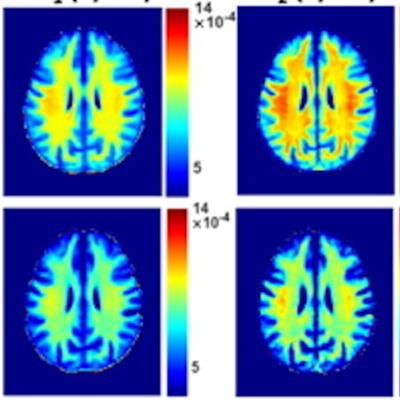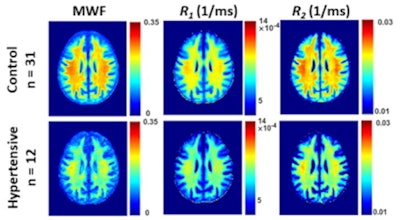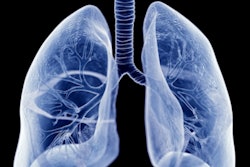
High blood pressure appears to increase a person's risk of cognitive disorders, according to research presented June 8 at the International Society for Magnetic Resonance in Medicine (ISMRM) meeting.
The study suggests that high blood pressure may affect an individual's brain through "downstream impairments of the cerebral blood flow as a consequence of cerebral artery remodeling," said presenter John Laporte of the National Institute on Aging, Baltimore, MD.
"[Hypertension] status may be a reliable indicator of those at risk of myelin degeneration among cognitively unimpaired adults," he told session attendees.
High blood pressure has been shown to be a risk factor for a variety of neurodegenerative diseases, but its effect on small cerebral structures, particularly myelination, is unclear, Laporte explained. He and his colleagues used multicomponent MR relaxometry and diffusion-tensor imaging (DTI) to uncover any links between hypertension and cerebral microstructural integrity, focusing on myelin content, in a group of cognitively healthy adults.
The study included 90 individuals; of these, 30% had high blood pressure, 3.3% were diabetic, and 33.3% were smokers. All underwent an MRI exam that used a BMC-mcDESPOT protocol (which consists of both short and long T1 and T2 components); their blood pressure was also tracked three times in a seated position, with hypertension defined as readings higher than 140/90. The researchers generated whole-brain maps, focusing on 14 white matter regions of interest.
They reported significant associations between high blood pressure and relaxometry and DTI metrics in a number of white-matter brain regions.
"Specifically, we found negative regional correlations between hypertension and MWF [myelin water fraction], a specific and direct measure of myelin content, with hypertensive subjects exhibiting significantly lower values of MWF," the group noted.
 Examples of myelin water fraction and relaxation rates (R1 and R2) parameter maps averaged across participants who are either hypertensive or nonhypertensive (control) drawn from a limited age range (70 to 94 years) to mitigate the effect of age. Results are shown for a representative slice. Visual inspection indicates that overall, hypertensive patients exhibit lower regional MWF, R1 and R2 values, as compared with controls. Image and caption courtesy of John Laporte.
Examples of myelin water fraction and relaxation rates (R1 and R2) parameter maps averaged across participants who are either hypertensive or nonhypertensive (control) drawn from a limited age range (70 to 94 years) to mitigate the effect of age. Results are shown for a representative slice. Visual inspection indicates that overall, hypertensive patients exhibit lower regional MWF, R1 and R2 values, as compared with controls. Image and caption courtesy of John Laporte.The study offers a way to assess patients' risk of cognitive decline, according to Laporte and colleagues.
"[Our] work provides new insights into the association between hypertension and axonal demyelination among cognitively normal individuals ... [and] motivates further investigations to elucidate the extent to which hypertension and myelination are related in neurodegenerative diseases, including in Alzheimer's disease and dementias," they concluded.





















